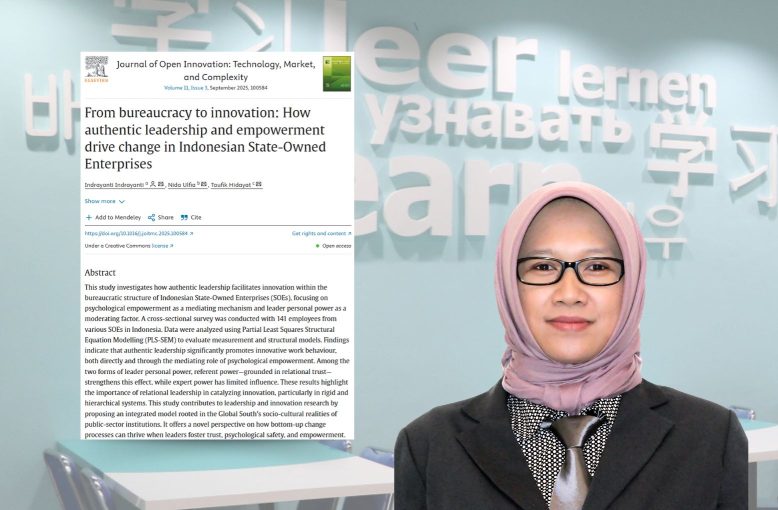
Yogyakarta, July 2, 2025 — Rigid bureaucratic culture has long been a challenge to fostering innovation in Indonesia’s State-Owned Enterprises (SOEs). A recent study by a team of researchers from Universitas Gadjah Mada (UGM) reveals that authentic leadership and psychological empowerment are critical drivers of innovation within SOEs in Indonesia.
Published in the high-impact international journal Journal of Open Innovation: Technology, Market, and Complexity (Scopus Q1, CiteScore 14.0), the study was authored by Indrayanti, Nida Ulfia, and Taufik Hidayat. The article, titled “From Bureaucracy to Innovation: How Authentic Leadership and Empowerment Drive Change in Indonesian State-Owned Enterprises,” argues that innovation is not just about structure—but about genuine leadership and empowered employees.
The research involved 157 employees across various SOE sectors and employed Partial Least Squares Structural Equation Modelling (PLS-SEM) to analyze the data. Key findings include:
-
Authentic leadership significantly strengthens organizational culture.
-
A healthy organizational culture mediates the emergence of innovative work behavior.
-
Psychological empowerment boosts employees’ confidence, sense of purpose, and initiative.
With a humanistic and strategic approach, the study reinforces that public sector transformation must start from within—through authentic leaders and empowering work environments. The study’s relevance aligns with the goals of SDGs 8, 9, and 16, particularly in building resilient and innovative institutions.
Abstract
This study investigates how authentic leadership facilitates innovation within the bureaucratic structure of Indonesian State-Owned Enterprises (SOEs), focusing on psychological empowerment as a mediating mechanism and leader personal power as a moderating factor. A cross-sectional survey was conducted with 141 employees from various SOEs in Indonesia. Data were analyzed using Partial Least Squares Structural Equation Modelling (PLS-SEM) to evaluate measurement and structural models. Findings indicate that authentic leadership significantly promotes innovative work behaviour, both directly and through the mediating role of psychological empowerment. Among the two forms of leader personal power, referent power—grounded in relational trust—strengthens this effect, while expert power has limited influence. These results highlight the importance of relational leadership in catalyzing innovation, particularly in rigid and hierarchical systems. This study contributes to leadership and innovation research by proposing an integrated model rooted in the Global South’s socio-cultural realities of public-sector institutions. It offers a novel perspective on how bottom-up change processes can thrive when leaders foster trust, psychological safety, and empowerment. The findings suggest that SOEs aiming for sustainability and agility should incorporate empowerment-based leadership into reform strategies. Leadership development should focus on technical competence and relational credibility. Future research is encouraged to employ longitudinal or mixed-method approaches to capture the evolving dynamics of leadership and innovation over time and across diverse organizational contexts.
Keywords: Authentic leadership; Psychological empowerment; Personal power; Innovative work behaviour; State-owned enterprises; Public-sector transformation; Indonesia
📖 Read the full article online:
https://www.sciencedirect.com/science/article/pii/S2199853125001192
Based on its keywords, this article is a research output aligned with SDG Goals 8, 9 & 16.
Congratulations to Indrayanti and the research team!
Writer & Editor: UP & Public Relations Team
